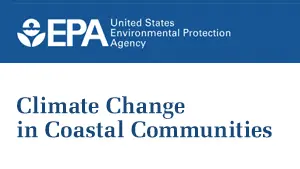 US EPA maintains a website that focuses on essential information for coastal communities planning for the effects of climate change.
US EPA maintains a website that focuses on essential information for coastal communities planning for the effects of climate change.
The effects of climate change have been measured and observed in shoreline communities for decades. Tidal flooding happens more often, extreme storm events are increasing, the water table is higher, aquifers are getting saltier, and there are many such indicators of change.
Shoreline places will see all the temperature and precipitation changes that affect their general region. They face further risks from sea level rise and coastal flooding. If shoreline communities are already at risk from coastal storms, that will get worse as the sea rises.
Few places that have an economic tie to coastal waters (e.g., recreation, tourism, fishing, boating, shipping, etc.) can count on things remaining as they were for decades to come.
Click here to view the resource.




